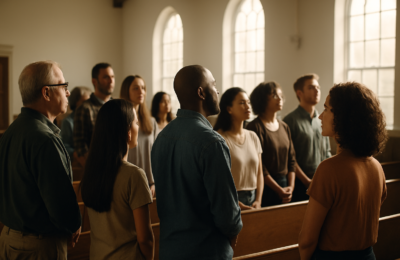Part 1 of Marriage and Family
Scripture: Genesis 2:24
“Therefore a man shall leave his father and his mother, and cleave to his wife; and they shall become one flesh.” (Genesis 2:24, LSB). With this succinct declaration, Scripture establishes the foundation of marriage at the dawn of creation. God’s design is clear: marriage is the one-flesh covenant union of one man and one woman, intended for life. In today’s culture, however, the very definition of marriage is contested. Many see marriage as a human contract for personal fulfillment, easily redefined or discarded. Competing modern views (e.g. open marriages, same-sex marriages, casual cohabitation) diverge sharply from the biblical blueprint. This raises a crucial question: What is marriage according to God, and why does it matter for society? In this opening article of our series, we will explore God’s original intent for marriage as revealed in Scripture and contrast it with modern reimaginings. We will see that marriage, according to the Bible, is far more than a private romance—it is a sacred covenant with profound social and spiritual implications. Furthermore, we will consider how honoring God’s blueprint for marriage promotes human flourishing and a thriving society. Our tone throughout is apologetic (defending the truth in love) and pastorally warm. We draw on Scripture, theological insight, and even social research to show that when we align with God’s design for marriage, we experience blessing—as individuals, families, and communities.
Created in Eden: Marriage as God’s Design
The concept of marriage originates with God, not man. In Genesis 2, after creating the first man, Adam, God declares: “It is not good for the man to be alone; I will make him a helper suitable for him” (Genesis 2:18, LSB). None of the animals suffice as this complementary partner, so God fashions the first woman, Eve, from Adam’s side and brings her to him (Genesis 2:21–22). Adam immediately recognizes their intended union, rejoicing, “This one is bone of my bones, and flesh of my flesh” (Genesis 2:23). Then we read the foundational statement in Genesis 2:24 that a man leaves his parental home to cleave (be joined) to his wife, and the two become “one flesh.” Jesus Himself later quoted this verse and added, “What therefore God has joined together, let no man separate” (Mark 10:9, referencing Genesis 2:24), underscoring the divine origin and permanence of marriage.
Several key truths emerge from the creation narrative about marriage’s essence. First, marriage is between a male and a female. God created humanity in His image as “male and female” (Genesis 1:27), and it is this complementary pair that He joins in marriage. The difference in sex is integral to the definition; husband and wife are equal in dignity (both image-bearers of God) yet complementary in role and anatomy, designed to fit together (literally and figuratively) as “one flesh.” Second, marriage is designed to be an exclusive and lasting union. To “cleave” or “hold fast” (Gen 2:24) implies strong, enduring commitment—much more than a casual relationship. The term covenant later emerges in Scripture to describe marriage (e.g. Malachi 2:14 calls a wife “your companion and your wife by covenant”). A covenant is a binding agreement under God; thus, marriage involves sacred vows of fidelity. Wayne Grudem (2018) notes that biblically, marriage is a covenantal bond, not merely a contract, meaning it is grounded in unconditional promises before God (p. 220). In a contract, if one party fails to uphold terms, the other may walk away; but in a covenant, the commitment remains steady (“for better or worse”) . God’s intent from the beginning was that marriage be a lifelong union (Genesis 2:24; cf. Matthew 19:6), broken only by death (Romans 7:2).
Third, marriage serves multiple God-ordained purposes. Companionship is one purpose—God created the woman to alleviate man’s aloneness (Gen 2:18). The tender phrase “helper suitable for him” indicates that husband and wife are partners working together, each supplying what the other lacks. In marriage, two individuals covenant to share life’s joys and trials in mutual support. Another purpose is procreation and family formation. After creating man and woman, God blessed them and said, “Be fruitful and multiply, and fill the earth…” (Genesis 1:28). This is often called the “creation mandate” or cultural mandate. Marriage provides the stable context for bearing and raising children. Sociologists note that the intact, two-parent family has historically been the fundamental unit of society across cultures . Malachi 2:15 suggests God’s intent in making husband and wife “one” was to seek “godly offspring.” In other words, marriage is the seedbed for the next generation—ideally nurturing children in love and teaching them to know the Lord (cf. Deuteronomy 6:6–7). This leads to another purpose: reflection of God’s covenant love. In Ephesians 5:31–32, the Apostle Paul quotes Genesis 2:24 and reveals a profound mystery: human marriage is meant to be a picture of the relationship between Christ and His Church. The husband’s loving headship and the wife’s respectful partnership are to emulate Christ’s self-giving love and the Church’s devotion (Ephesians 5:25–33). Thus, marriage has an evangelistic, illustrative function—showing the world the covenant-keeping love of God. As John MacArthur observes, “Christian, your marriage is a testimony to the relationship between Christ and the church. Your marriage will either tell the truth about that relationship, or it will tell a lie.” (MacArthur, 1994, p. 85). In summary, from Eden onward, marriage is a God-instituted, sacred union—exclusive, lifelong, heterosexual, and oriented toward both relational intimacy and the raising up of families under God’s blessing.
Modern Views vs. the Biblical Covenant
Our contemporary culture’s understanding of marriage often diverges drastically from this biblical blueprint. Many today view marriage primarily as a contract of romantic affection, subordinate to personal happiness. If the romance fades or individual “needs” aren’t met, the marriage is seen as disposable. Indeed, no-fault divorce laws have normalized the dissolution of marriages for virtually any reason. Furthermore, the very definition of marriage has been expanded in many societies to include same-sex partners. In 2015, the U.S. Supreme Court (Obergefell v. Hodges) legalized same-sex marriage, essentially asserting that marriage is a fluid social construct that can be redefined based on adult desires. While Christians are called to love all people, we must candidly observe that this redefinition stands in stark contrast to the creation order of male-female union. Marriage in Scripture is consistently presented as male-female (Matthew 19:4–5, Ephesians 5:31) and intrinsically oriented toward procreation (even if every couple does not have children, the union type that creates new life is honored). Modern views that treat gender as irrelevant to marriage miss this fundamental aspect of God’s design.
Beyond issues of gender, secular perspectives also differ on the purpose of marriage. Increasingly, marriage is seen as a capstone to personal achievement—a means of self-fulfillment or emotional satisfaction. This aligns with what sociologist Philip Rieff and theologian Carl Trueman describe as expressive individualism, where personal identity and happiness are paramount . In the expressive individualist view, any relationship (including marriage) is valid so long as it authentically expresses the individuals’ inner feelings. The biblical view, by contrast, calls us to something higher than the self. Marriage is not merely about self-expression but about self-giving. It is a covenant of sacrificial love that often involves denying oneself for the good of one’s spouse and children—just as Christ sacrificed for us (Eph 5:25). Trueman (2020) has argued that the modern mindset exalts sexual and romantic fulfillment as central to personal identity, which is why departures from biblical marriage (such as cohabitation, adultery, or serial divorce) are often justified in the name of “being true to oneself” . Yet Jesus teaches us that true life is found not in asserting our desires above all, but in obedience to God’s design (Matthew 16:24–25).
Another modern trend is to treat marriage as optional or even burdensome. Many young adults are delaying or forgoing marriage, often preferring cohabitation or casual relationships. Behind this is sometimes a fear that marriage will stifle freedom or an assumption that it’s an outdated institution. But far from being a mere tradition or “piece of paper,” marriage as God designed is a source of stability and blessing. Social science research consistently shows that, on average, married people tend to be healthier and happier than their unmarried or cohabiting counterparts, and their children fare better on many metrics (Wilcox et al., 2022). This is no accident—God’s ways tend toward human flourishing. As one cultural commentator quipped, “You don’t break God’s laws; you break against them.” When we violate the intended order (for instance, treating sex as casual outside of marriage or treating marriage vows as revocable at will), the fallout can be significant: broken hearts, broken homes, and fragmented communities.
In contrast, when marriage is honored as a lifelong covenant, it provides a solid foundation not only for the couple but for society at large. Grudem (2020) points out that the stability of the family unit contributes to social order and moral instruction of the young (p. 1062). Historically, civilizations that have upheld strong marriage and family structures have tended to be more stable. It is telling that even some secular thinkers now recognize the cost of family breakdown. A recent analysis by economist Melissa Kearney found that children raised by continuously married parents have significantly higher chances of escaping poverty and achieving success than children in single-parent or fragmented homes (Kearney, 2023, pp. 4–6). In fact, the United States—where roughly 23% of children live with a single parent, the highest rate in the world—has seen rising inequality partly linked to this family structure change . While God certainly extends grace to single-parent families and can work good in any circumstance, these sobering statistics affirm what Scripture long ago taught: God’s design of mother and father in a faithful marriage provides the most secure environment for the next generation. Cultural commentator Chuck Colson once observed that after decades of undermining the traditional family, society is “seeing the disastrous social fallout” – from poverty to crime – and even secular voices are calling to “make intact, two-parent families the ideal again” .
Marriage as a Foundation for Society’s Flourishing
Why is marriage often called the “building block” of civilization? Because it integrates several crucial dynamics (sex, love, procreation, parental investment) into one stable institution that benefits the wider community. When a man and woman marry, they typically form a new household. This household ideally becomes an economic unit (working together, pooling resources), a social unit (offering hospitality and help to others), and a unit of spiritual influence (modeling love, raising children in virtue). Healthy marriages thus contribute to social capital. Research from the Institute for Family Studies indicates that communities with higher proportions of married-parent families tend to have lower crime rates and better educational outcomes for children . Conversely, widespread family breakdown can burden society through increased poverty, welfare dependency, and interpersonal traumas. Sociologist David Popenoe noted that the “massive erosion of fatherhood” and marriage contributes significantly to many social problems . It is not an exaggeration to say that as the family goes, so goes the nation. Pope John Paul II once said, “As the family goes, so goes the nation and so goes the whole world in which we live.”
Biblically, we see this principle in Israel’s history: strong families adhering to God’s covenant led to blessing, whereas infidelity (both spiritual and marital) led to societal ruin. Marriage was intended to channel human sexuality and kinship in a productive, loving direction—preventing the chaos of promiscuity or fatherlessness. John Stonestreet of the Colson Center remarks that the family is a kind of “training ground” for virtue: it’s where children learn responsibility, empathy, and respect for authority, which in turn affects how they function as citizens. Indeed, the family is often called the domestic church or a microcosm of society. It’s within families that values and faith are first instilled (Deuteronomy 6:6–7). When marriages fail en masse, generations can lose that formative influence. Neil Shenvi and Pat Sawyer (2023) note that secular ideologies which treat the nuclear family as merely one lifestyle among many fail to account for the God-given moral structure that the family provides (pp. 210–213). The biblical worldview does not idolize family (Jesus is clear that loyalty to Him comes even above family, see Luke 14:26), but it does present the family as an arena in which discipleship and social stability are nurtured.
Importantly, the spiritual significance of marriage also undergirds society. Marriage, when lived in fidelity, becomes a channel of God’s common grace. For example, a husband and wife who forgive and remain committed through trials demonstrate grace and stability not only to their children but to neighbors and friends. In a culture of disposable relationships, such commitment is a testimony of God’s faithful love. Furthermore, married couples within the church often provide ministry in unique ways—whether through hospitality, mentoring younger couples, or teaming up in service. Rosaria Butterfield (2018) describes how Christian households can be “hospitality hubs” for the lonely and lost, bringing people into a loving family atmosphere as a bridge to the gospel (pp. 171–173). In this sense, marriage (and the families it produces) can be missional.
None of this is to say that unmarried people have no role in society or church (we will later discuss singleness as a high calling). Rather, it is to highlight that marriage as an institution is a gift from God to humanity at large. God established it in Eden before the Fall—before any nation or church existed—indicating its foundational role in the human project. Christian ethics therefore uphold marriage’s sanctity not just for Christians but as part of the created order for all people (Grudem, 2018, p. 553). We can affirm this while also remembering that marriage in a fallen world often falls short of the Edenic ideal. Marriages can become sources of great pain through sin, selfishness, or tragedy. Yet even the brokenness points to the fact that something precious is at stake. When marriage is done God’s way—with Christ at the center, mutual love and respect, sexual fidelity, and openness to life—it brings glory to God and good to others. It is “honorable among all” (Hebrews 13:4) and to be protected.
Covenant Blessings and Responsibilities
Understanding marriage as God’s blueprint carries both encouragement and responsibility for believers. On one hand, it dignifies marriage far above the shallow cultural narratives. Marriage is not just a legal formality or a social construct we can alter at whim—it is rooted in God’s creative purpose. This should give us confidence to advocate for marriage truth in the public square with gentleness and respect (1 Peter 3:15). We have a positive vision to offer: that lifelong, loving marriage between one man and one woman is not only true to God’s Word, but also good for men, women, children, and society. As The Rise and Triumph of the Modern Self notes, the sexual revolution’s promise of freedom has often led to broken identities and relationships, whereas the Christian vision of marriage and family offers a holistic context for love, identity, and growth (Trueman, 2020, pp. 300–305).
On the other hand, knowing God’s high design for marriage means we must approach our own marriages (or future marriages) with serious commitment and reliance on God. Covenant faithfulness in marriage requires Christlike sacrifice. Husbands are called to love their wives “just as Christ loved the church and gave Himself up for her” (Eph 5:25, LSB), a daunting standard that can only be met by the Holy Spirit’s help. Wives are called to respect and lovingly support their husbands, as the church does Christ (Eph 5:22–24). Both are called to submit to one another out of reverence for Christ (Eph 5:21), practicing humility and forgiveness daily. In a culture that preaches a gospel of self-assertion, Christian marriage preaches the counter-message of self-denial and mutual service. This discipleship in the domestic sphere has ripple effects. Children raised in such an environment are far more likely to carry a strong Christian worldview into adulthood (Prov 22:6), and the watching world sees a tangible example of gospel grace. John and Jeanine, a Christian couple married for 50 years, recently shared that the key to their enduring marriage was viewing it as a ministry: “Our marriage is one way we serve God together. It’s bigger than just us” (personal testimony). This perspective kept them faithful through financial hardships and health crises. Their story is echoed by countless believers who see marriage not as a capstone of happiness, but as a platform for God’s glory and a workshop for personal sanctification.
In practical terms, upholding God’s blueprint means the church must support marriages. We should teach clearly on the meaning of marriage, prepare engaged couples thoroughly, and provide counseling and community for married couples to thrive. The church should also gently correct distortions—such as the idea that marriage is only about the couple’s happiness. As MacArthur warns, some Christian families fall into making an idol of “family time” or children’s activities to the neglect of church and ministry . But “Christian families are not an end in themselves. They exist to further the work of the kingdom” (MacArthur, 2008, para. 12). In other words, our marriages and families should be outward-looking, not self-enclosed. When we invite the lonely into our homes, prioritize corporate worship, or work together in mission, we keep our marriages aligned with God’s kingdom purposes rather than turning inward in a “holy huddle.”
Finally, in upholding the sanctity of marriage, we must also extend grace. Not everyone has experienced a healthy marriage or family. Some readers may come from divorced or abusive homes; others may carry regret from a failed marriage. The good news of Jesus Christ is that redemption is possible. Broken marriages can be restored by His grace, and even if reconciliation isn’t possible, individuals can find forgiveness and a new start in Christ. The church should be a place where those hurting from marital breakdown find support and hope. As we will explore in Part 3, God can “restore the years the locust has eaten” (Joel 2:25) for broken families. Thus, even as we uphold the ideal, we minister God’s mercy to the fallen.
In conclusion, God’s definition of marriage—as a monogamous, lifelong covenant between a man and a woman—is not only a theological doctrine but a blueprint for a thriving society. It is rooted in creation, affirmed by Jesus, and echoed by social realities. When we honor this blueprint, we partake in a blessing that radiates outward: marriages become beacons of hope and stability in a world of chaos. Let us, as Christians, recommit to holding marriage in high esteem (Hebrews 13:4), living out its calling with God’s help, and lovingly defending its truth in the public square. In an age of confusion about marriage, the church has an opportunity to shine by example—showcasing marriages marked by covenant love, purity, and purpose. Such marriages will not only fulfill us and nurture our children, but ultimately point to the greatest marriage of all: between Christ and His redeemed bride. To Him be the glory.
Next → Parenting in a Post-Christian World
View all of Marriage and Family
References
Butterfield, R. (2018). The Gospel Comes with a House Key. Crossway.
Colson, C. (2008). How Shall We Live? (Breakpoint commentary). Colson Center for Christian Worldview.
Grudem, W. (2018). Christian Ethics: An Introduction to Biblical Moral Reasoning. Crossway.
Grudem, W. (2020). Systematic Theology: An Introduction to Biblical Doctrine (2nd ed.). Zondervan.
Kearney, M. S. (2023). The Two-Parent Privilege: How Americans Stopped Getting Married and Started Falling Behind. University of Chicago Press.
MacArthur, J. (1994). Different by Design: God’s Blueprint for Men and Women. Victor Books.
MacArthur, J. (2008, May 19). How Can We Rescue the Family? [Article]. Grace to You.
Shenvi, N., & Sawyer, P. (2023). Critical Dilemma: The Rise of Critical Theories and Social Justice Ideology. Harvest House.
Trueman, C. R. (2020). The Rise and Triumph of the Modern Self: Cultural Amnesia, Expressive Individualism, and the Road to Sexual Revolution. Crossway.
Wilcox, W., Wang, W., & ElHage, A. (2022, June 17). ‘Life Without Father’: Less College, Less Work, and More Prison for Young Men Growing Up Without Their Biological Father. Institute for Family Studies.
Yuan, C. (2018). Holy Sexuality and the Gospel: Sex, Desire, and Relationships Shaped by God’s Grand Story. Multnomah.








